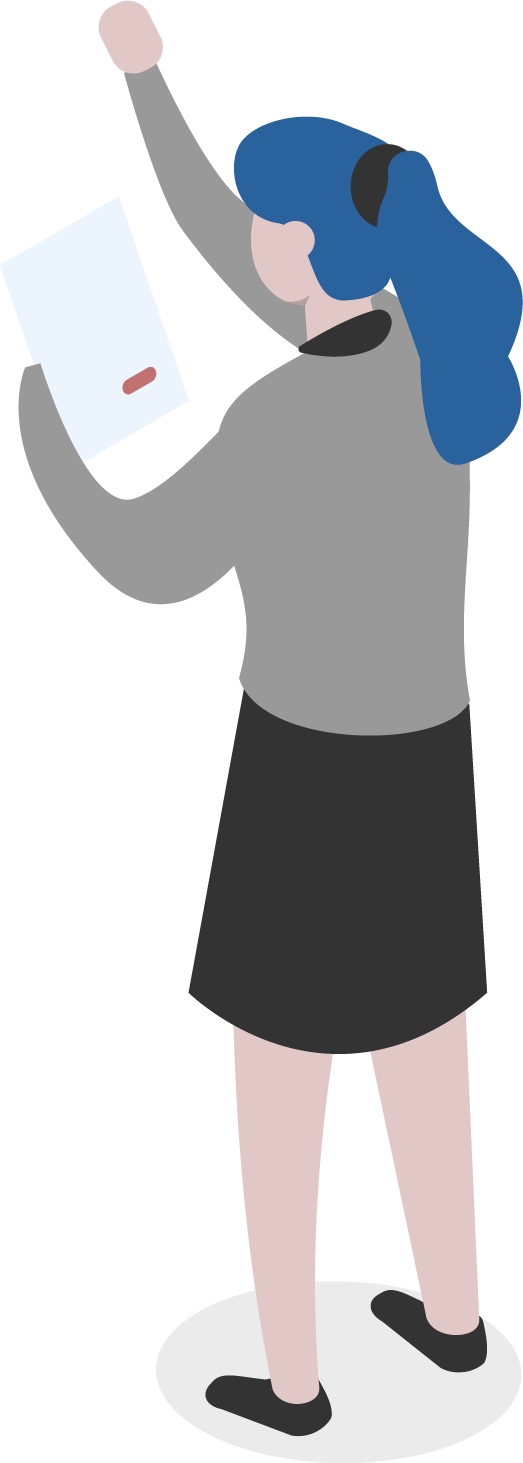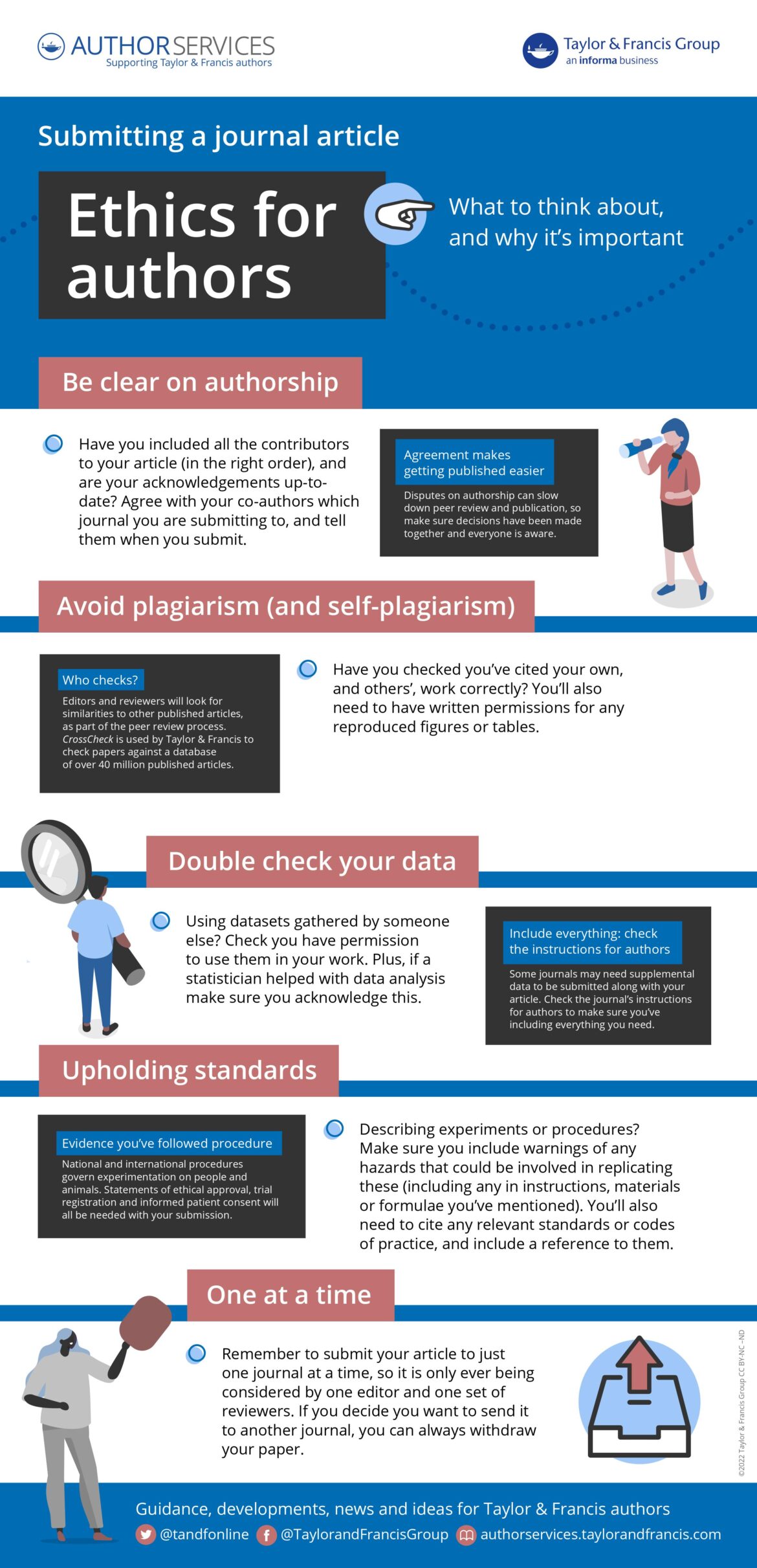Ethics for authors
Guidance, support, and your ethics checklist
What does ethics mean in journal publishing?
Being published in a peer-reviewed journal is an essential part of every researcher’s career. Benefits to you as the author (and to your funder and institution) come from the work that is done to make sure that every article adheres to certain standards. For example, researchers must report their work accurately so that other people can make use of it and apply it.
The Taylor & Francis Editorial Policies set out many of the guidelines for ethical publishing which authors should understand and follow. There is also ethical guidance for journal editors and peer reviewers. Every journal also explains its publishing and peer-review policy on its Aims & Scope page on Taylor & Francis Online, or for F1000Research, you can find the editorial and ethical policies here.
Below are the major ethical issues you should be aware of as an author. Use these, our Editorial Policies, and the infographic (also available in Chinese) to guide you as you submit and publish your research.
Taylor & Francis is a member of the Committee of Publications Ethics (COPE). COPE provides ethical guidelines and codes of conduct for publishers, journal editors, and reviewers.
Get familiar with instructions for authors
Be prepared, speed up your submission, and make sure nothing is forgotten by understanding a journal’s individual requirements.
Guidance on ethical issues for authors
Case 1: Authorship
Every author listed on a journal article should have made a significant contribution to the work reported. This could be in terms of research conception or design, or acquisition of data, or the analysis and interpretation of data. As an author or co-author, you share responsibility and accountability for the content of your article.
Read more on defining “authorship”: co-authors, corresponding authors, and affiliations.

What to avoid:
Case 2: Plagiarism
When citing others’ (or your own) previous work, please make sure you have:
Clearly marked quoted verbatim text from another source with quotation marks.
Attributed and referenced the source of the quotation clearly within the text and in the Reference section.
Obtained permission from the original publisher and rightsholder when using previously published figures or tables.
If you are discussing one particular source at different points in your paper, make sure you correctly cite every instance.
Make sure you avoid accidental plagiarism by getting your work checked for similarities.
Make sure you avoid self-plagiarism

Any allegations of plagiarism or self-plagiarism made to a journal will be investigated by the editor of the journal and Taylor & Francis. If the allegations appear to be founded, we will then contact all named authors of the paper and request an explanation of the overlapping material. We may ask Journal Editorial Board members to assist in further evaluation of the paper and allegations. If the explanation is not satisfactory we will reject the submission. We may also choose not accept future submissions.
Read our full plagiarism policies and guidance for authors to find out what plagiarism is (and isn’t) and how you can avoid it.
Case 3: Data fabrication / falsification
It is essential that all data is accurate, and representative of your research. Data sharing is more and more prevalent, increasing the transparency of raw data. Some journals request that you upload raw data as a supplemental file for publication (you can check the instruction for authors to see if this is the case on the journal you are submitting to). Some journals and platforms such as F1000Research advocate a more progressive open data policy, requiring the raw data underlying an article to be openly available, so it’s crucial to be aware of this when submitting your work.
Taylor & Francis encourages you to submit your supplemental data with your article. Find out how we host it, and make it more discoverable.
Cases of data fabrication/falsification will be evaluated by the editor of the journal and Taylor & Francis. We may then ask authors to provide supporting raw data where required. We may also ask Journal Editorial Board members to assist in further evaluation of the paper and allegations. If the explanation is not satisfactory we will reject the submission. We may also choose not accept future submissions.

Case 4: Competing interests
It is very important to be honest about any competing interests, whether sources of research funding, direct or indirect financial support, supply of equipment or materials, or other support.
Read our full guidelines on what a competing interest is and how to declare it when you submit your paper.
For some areas of research, such as medicine, evidence of ethical approval needs to be provided before the journal will publish the research. Always check the journal’s instructions for authors for information about proof of ethics approval.
If an author does not declare a competing interest to the journal upon submission, or during review, and it affects the actual or potential interpretation of the results, the paper may be rejected or retracted.
Ready to submit your paper? Your ethics checklist
Before you submit, make sure you’ve:
Read the journal’s instructions for authors, and checked and followed any instructions regarding data sets, ethics approval, or statements.
Named all authors on the paper, and the online submission form.
Referenced all material in the text clearly and thoroughly.
Carefully checked data and included any supplemental data required by the journal.
Declared any relevant competing interests to the journal.
Obtained (written) permission to reuse any figures, tables, and data sets.
Only submitted the paper to one journal at a time.
Finally, notify all the co-authors once you have submitted the paper.

Further resources
Download the ethics for authors infographic in Chinese.
An introduction to research integrity and selective reporting bias for journal editors and researchers.
Taylor & Francis refers editors to the COPE Code of Conduct and Best Practice Guidelines for Journal Editors and recommends all reviewers adhere to the COPE Ethical Guidelines for Peer Reviewers.
